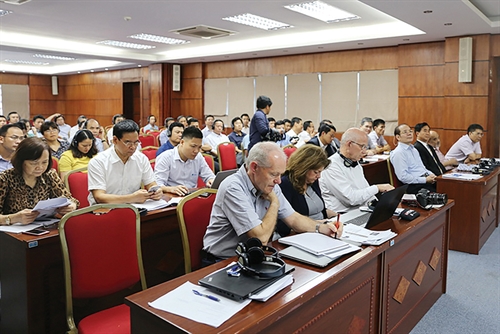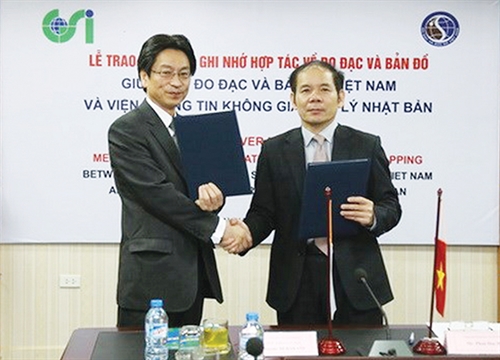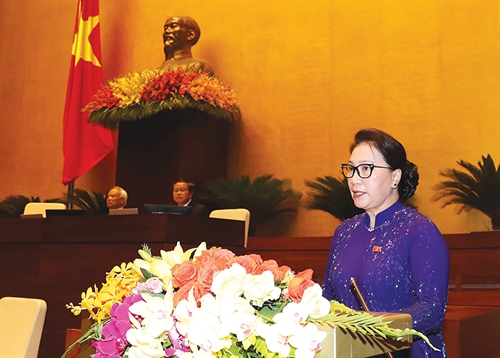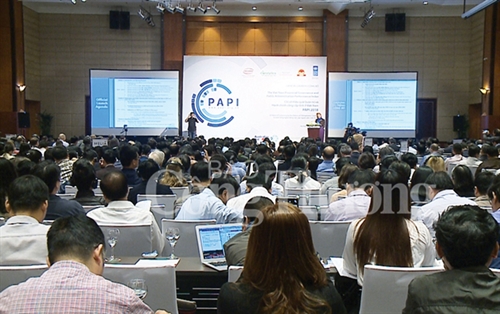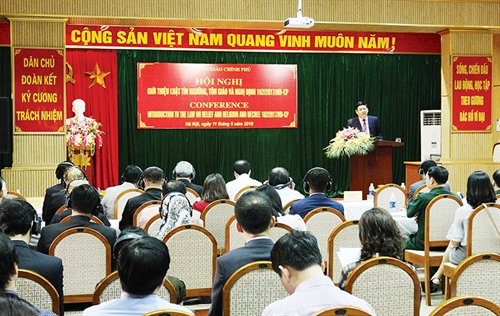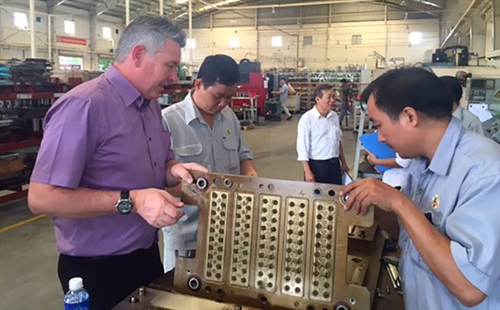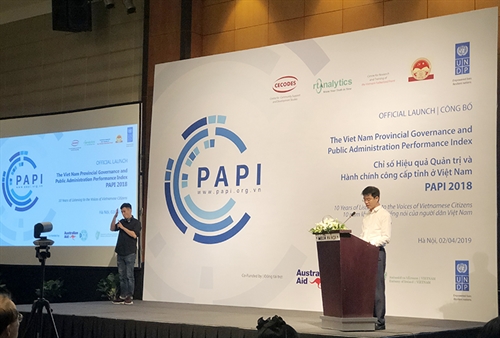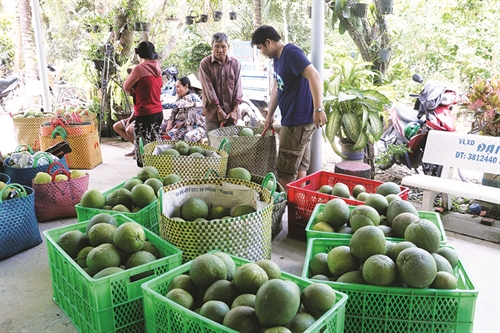This paper presents key analysis and findings about citizens’ perception of and experiences with governance and public administration performance over the past decade through the Vietnam Provincial Governance and Public Administration Performance Index (PAPI) surveys from 2011-18, which were largely informed by the priorities and orientations set forth in the 2011-20 socio-economic development strategy (SEDS). It suggests that the upcoming 2021-30 SEDS address more explicitly citizens’ expectations as reflected in the PAPI findings of the last ten years, and be informed by a deliberative public consultation process that takes into account the aspirations of citizens from all income strata.
Caitlin Wiesen, Resident Representative, UNDP Vietnam
Introduction
Vietnam is reviewing the outcomes of the 2011-20 SEDS and discussing orientations for the 2021-30 SEDS. For the current SEDS, the country has set the goal to become an industrialized and modern country by 2020, “with sustainable, effective and efficient development, coupled with promoting social progress and equality, conserving and protecting natural resources and environment, maintaining socio-political stability, safeguarding national independence, sovereignty, unity and territorial integrity”. The 2011-20 SEDS puts people at the heart of the goal, and sustainable development as the cross-cutting issue in the country’s development agenda.
The Vietnam Provincial Governance and Public Administration Performance Index (PAPI) initiative, which was piloted in 2009 and 2010, commenced its annual and nationwide measuring mission in 2011, the year in which the 2011-20 SEDS was in place. This was thus the first opportunity for PAPI findings to inform the design and content of the SEDS.
Inputs for PAPI indicators were grounded on the SEDS in addition to laws and public policies, in effect to create baselines and monitor how the national development agenda is implemented over time. PAPI’s development philosophy puts citizens who can contribute to the assessment of the performance of central and local authorities at the heart of Vietnam’s development. Therefore, PAPI findings help track the progress and results in delivering the promises contained in the SEDS, the five-year socio-economic development plans and related public policies by state agencies at all levels.
This paper presents a summary of findings from PAPI as a source of evidence to inform the upcoming 2021-30 SEDS areas of focus. It discussed five key issues:
- Issues of citizens’ greatest concern;
- Governance and public administration issues;
- Social issues;
- Economic issues; and,
- Environmental issues.
Issues of citizens’ greatest concern
Every year since 2015, PAPI asks citizens to state their issue of greatest concern to identify the most important issue the Government should tackle. This question allows citizens to provide input as to where they feel the Government should devote its energy and resources. The question helps inform policymakers and practitioners of what should be prioritized in the national development agenda.
Findings over time on this question show that poverty has remained the most important issue to Vietnamese citizens since 2015. In 2018, the top five issues of priorities that the State should address also include economic growth, corruption, jobs and employment, and environment.
 |
 |
Despite rapid declines in poverty and improvements in economic conditions, over the years since PAPI asks the questions about issues of greatest concern, many Vietnamese, particularly those in the lower income strata, have remained of the view that poverty should be the top priority requiring the State to address. The percentage of those who chose the issue rose from 18 percent in 2015 to 24 percent in 2016, 28 percent in 2017 and 25 percent in 2018 (see Figure 1). Fears about falling back into poverty and concerns about the impact of poverty on overall national development were still the key drivers behind the continued importance of poverty reduction. Deeper analysis shows that income inequality, which is discussed later in the paper, was the key economic driver for poverty concerns.
 |
 |
Looking more deeply at the data, while poverty remains the issue of overwhelming concern for 25 percent of respondents, changes in the issues of concern over time reveal some important trends. International public opinion experts suggest that as countries develop, citizens are more likely to shift from micro-level economic concerns to non-economic concerns. The analysis of changes over time, presented in Figure 2, shows that this may be taking place in Vietnam. The sharpest increases in 2018 were in concerns about corruption and economic growth. Concerns about law and order, education and land compensation also rose significantly.
 |
 |
When looking more closely into issues of greatest concern by ethnicity, both Kinh and non-Kinh respondents shared similar priorities for poverty and economic growth in 2018. As Figure 3 shows, the top five issues of greatest concern among non-Kinh respondents (ethnic minorities) include poverty, participation, economic growth, roads and land compensation. Meanwhile, the top five issues of priorities among the Kinh majority were poverty, economic growth, corruption, jobs and employment, and environment (see Figure 4). Apparently, non-Kinh respondents were more concerned about participation, poverty, land compensation and roads than Kinh respondents. As Figure 5 reveals, on average, the percentage of non-Kinh ethnic minorities that were concerned about poverty in 2018 was 8 percent more than that of Kinh-majority.
 |
 |
 |
 |
Governance and public administration issues
Governance and public administration performance in 2018 improved across a wide range of aspects. There was progress, although at different rates, in five of the six “core” PAPI dimensions, namely Participation at the Local Levels, Transparency, Vertical Accountability, Control of Corruption, and Public Service Delivery. Public Administrative Procedures remained stable over time. The 2018 findings also reveal some challenges in important governance areas such as voluntary participation, land transparency, land use rights certification, and public primary education.
Since PAPI was initiated, the most important determinant of overall satisfaction with governance and public administration performance tends to be control of corruption in the public sector. The 2018 results show that citizens perceived less corruption in the provision of health care and education services, and less bribery in state employment, but reported roughly similar levels of corruption in the use of public funds and in land titling. In addition, more citizens across all groups said that corruption had decreased rather than increased, though they perceived the decrease to be greater at the commune level than at higher levels of government in 2018. While nearly 60 percent of citizens said that corruption at the commune level had decreased in the past three years, the proportion dropped to less than 50 percent when citizens responded to the same question about corruption at the national level. Also, corruption emerged as one of the top three issues of greatest concern in 2018. Such findings indicate the importance of addressing corruption at all levels of government in order to increase overall citizen satisfaction with government performance.
In 2018, there was a higher level of citizen satisfaction with transparency, especially in how poverty lists were formulated, and in transparency of commune budgets and expenditures. However, transparency in land use plans remains an important area where local governments can improve. One critical issue with transparency in land use plans is that over time, a small minority (less than one-fourth) of the population has been able to access information about local land use plans and less than one-third have had opportunities to provide comments.
Also in 2018, PAPI started measuring local governments’ performance in environmental governance and e-government. In terms of environmental governance, as Vietnam develops, a wide range of new governance challenges have emerged, including the growing need for environmental protection. The new environmental governance dimension reflects citizens’ assessment of two environmental aspects critical to their health: water and air quality. One fourth of respondents said water coming from waterways near their homes was unsafe even to swim in. More than one-third said that air quality had declined over the past three years.
Overall, the 2018 dimensional scores for environmental governance were well below the average level; provincial scores ranged from 3.54 to 6.74 points (on the 1 to 10-point scale). The gap between the highest and lowest scoring provinces in this dimension is large, implying that citizens in different provinces have quite varied experiences when it comes to environmental conditions. Interestingly, citizens in the Central Highlands were very concerned about water quality for everyday usage, including cooking, washing and swiming. The 2018 survey also shows that the environment remains one of the top five issues of greatest concern for Vietnamese citizens and there is little doubt that this trend will be confirmed over the coming years. It is therefore essential that this dimension features prominently in the new SEDS.
With rapidly growing access to the Internet and significant investment in the e-governance infrastructure by state agencies, there is an opportunity for government agencies and citizens to increase virtual interaction in order to obtain and share basic information about public policy and public services. The 2018 survey findings from the new dimension of e-government in PAPI reveal that the percentage of respondents using government portals for administrative procedures, however, remained extremely low, at less than 4 percent of respondents. With Internet access at home reaching over 50 percent according to the 2018 PAPI survey, there is much scope for citizens and government to increase interaction online. The use of online government portals for government information and administrative procedures was very limited in 2018, even though government portals have been in existence for almost a decade. Much more could be done in order to increase access to government portals.
 |
 |
Social issues
PAPI measures various issues regarding social policy implementation. In this paper, findings about income inequality, public services and gender equality are presented to provide snapshots of how citizens assess the policy implications.
Poverty and income inequality
While Vietnam’s economic growth rate in 2018 was reported to reach 7 percent, Vietnamese citizens continued to cite poverty and hunger as the top two matters requiring additional efforts by the State. Poverty ranked first in the list of issues of greatest concern for the fourth year in a row.
Deeper analysis into PAPI data shows that the concern about poverty is based on a number of reasons. First, it relates to the fear about falling back into poverty among the respondents. Since 2017, respondents have been asked about why they are most concerned about poverty. The 2017 and 2018 findings show that around 45 percent of the respondents were worried that they would fall back into poverty and more than 55 percent worried about their families falling back into poverty. When disaggregated by income levels, the lower income respondents were, not surprisingly, the most concerned about falling back into poverty.
Second, and more interestingly, many respondents concerned about the impact of poverty on overall national development. It is remarkable that a majority of those who chose poverty as their greatest concern believed that poverty reduction has large implications for Vietnam’s development, with almost 90 percent of the respondents in all income strata selecting this option to explain about why they were so concerned about poverty in 2017 and 2018.
Third, income inequality may have been a significant factor that has made citizens concerned about poverty. When looking deeper into the income strata and examining the correlation with the poverty concern, it shows, as presented in Figure 6, as many as 90 percent of the PAPI respondents said their households earned less than VND 20 million (about USD 820) per month in 2018 compared with 10 percent that said their households earned more than VND 20 million (among these 10 percent, only 1.7 percent said their households earned more than VND 40 million).
Additionally, findings in Figure 7 show that income gap between ethnic minority and Kinh majority households is significant at VND 3 million per month (i.e., VND 10 million for Kinh households and VND 7 million for non-Kinh households). That income gap is even more significant for rural populations. For a rural Kinh, an average monthly household income was about VND 4 million greater than a rural ethnic minority household; and an urban Kinh household earned about VND 1.5 million greater than an urban ethnic minority household.
 |
 |
Provision of basic public services
The survey results for this dimension reveal a striking divergence in citizens’ satisfaction with different basic services. The Public Health sub-dimension, for example, saw continued improvement in 2018, largely thanks to the increased number of respondents accessing health insurance which rose from 80 percent in 2017 to 87 percent in 2018. This went beyond the target of 80 percent in the 2016-20 SEDS. Scores in the Basic Infrastructure sub-dimension, which includes garbage collection, road quality, electrification, and drinking water quality, also improved dramatically in 2018. For instance, the share of the population using unclean water decreased slightly from 6 percent in 2016 to 4.4 percent in 2018. Compared to the other public services, public primary education saw some decline, which was mainly due to lower satisfaction with the quality of primary schools, especially regarding the number of students per class and teachers’ favouritism toward students attending their after-classes given by same public-school teachers.
Public views regarding gender and leadership
As gender equality is a high priority in Vietnam’s sustainable development agenda, the 2018 report examines public views regarding gender and leadership positions. Findings from the research show that a majority of voters have no preference for either male or female candidates. Among the minority who do have a preference, more are likely to prefer men than women. This bias is most pronounced for political leadership positions, and, interestingly, among women.
The role of women in leadership positions is important, including for the fact that there are clear gender differences in the issues of greatest concern between women and men. Figure 8 reveals that women were far more concerned with poverty reduction and education than men. Men, on the other hand, were more likely to view economic growth, corruption, and national security issues as primary concerns. The difference in priorities highlights the need for equitable representation in government leadership positions.
Economic issues
Since the 2011-20 SEDS focuses largely on economic development targets, the following sections provide findings about how citizens perceived their household economic conditions, how willing they are to pay taxes for redistribution for poverty reduction, and their perception of the current rich-poor gap. These may inform the review of the current SEDS and the future strategy.
 |
 |
Household economic conditions
Since 2011, PAPI surveys have asked citizens to assess their household economic conditions, as the level of optimism about their own wealth may affect individuals’ assessment of governance. As Figure 9 shows, consistent with previous years, the 2018 survey results show that the vast majority of Vietnamese citizens said that their economic situation was neither good nor bad. Nonetheless, there was a decrease in the percentage saying their situation was poor, and a clear increase in the percentage saying their situation was good. This matches the responses for this question over the past five years, with an increasing number of citizens saying their household economic situation had improved.
In addition, 2018 witnessed a clear jump in the percentage of citizens saying that they expected their household economic situation to improve in the next five years, alongside a remarkable drop in the number of those saying they expected their situation to deteriorate. To understand some of the reasons for these changes, it is important to note that they may be due to Vietnam’s improved economic performance as GDP growth in 2018 was over 7 percent, the highest rate since 2008.
Willingness to pay taxes for redistribution
The 2018 PAPI data show that while there is a high level of support for paying taxes for redistribution of wealth for poverty assistance in poorer provinces, the support is greatest among wealthier and more educated respondents who have more resources and greater willingness to contribute to further poverty reduction. One might presume that richer respondents, who stand to gain less from individual or provincial transfers, would be less likely to support the policy of collecting taxes for redistribution through provincial transfers. However, as deeper analysis results show, this is decidedly not the case. It is not the poorest respondents who are more supportive of paying more taxes for wealth redistribution from their province to poorer provinces, but rather the wealthier respondents.
As mentioned earlier, approximately 90 percent of the households earn less than VND 20 million per month nationwide, while the wealthiest make up a much smaller proportion. Therefore, findings related to willingness to pay for redistribution for poverty reduction imply that policy on tax-based redistribution should be well-articulated and well-designed for citizens to believe that the poorer are not paying more for taxes than the wealthier.
 |
 |
Perceived rich-poor gap
Given optimism about the economic situation of households may impact citizens’ assessment of different aspects in PAPI, citizens’ attitude toward economic inequality in 2018 was also assessed. In general, a large proportion of respondents did not feel that the current rich-poor gap in Vietnam is a significant problem. In 2018, there were more respondents who perceived that the rich-poor gap was large or very large (34 percent) than those who viewed the gap as either very narrow or narrow (20 percent), while 46 percent said the gap was neither large nor narrow. Furthermore, since 2016, less than 30 percent of respondents have said that current economic inequality is too high. As economic conditions have improved over the past years, a declining number of respondents have expressed concern with inequality levels.
Another important question is how attitude toward inequality relates to income levels. The analysis shows that wealthier respondents seem to be more concerned with inequality than lower-income respondents. Further analysis shows that the factor with the strongest impact on a respondent’s concern with inequality is education; more educated respondents are more likely to express concern than less educated respondents.
Environmental issues
As PAPI findings over time have shown, environment has become an issue of increasing concern for citizens nationwide. In addition, according to the 2018 PAPI survey, citizens were aware of climate change as an important concern. In the survey, 77 percent said they believed the climate is changing. Pollution and greenhouse gas emissions are seen as changing climate patterns in Vietnam. This section introduces findings about citizens’ preferences around economic development and environmental protection, and how willing they are to pay for greener energy.
Trade-offs between environmental protection and economic growth
The recurrence of environmental problems in Vietnam today may have prompted citizens to be highly sensitive to the environmental consequences of large investment projects, both domestic and foreign. The 2018 survey results show that citizens place a higher priority on the environmental impacts than on the economic benefits of investment projects in their localities: the percentage of respondents preferring environmental protection to economic development at all costs increased from 69 percent in 2016 to 74 percent in 2018 (see Figure 10).
Most respondents prefer environmentally clean investors to come to their localities over those that contribute comparatively more to job creation and local tax revenues. In other words, while economic considerations such as job creation or tax revenue the investment generates have a significant effect on respondents’ evaluation of an investment project, environmental considerations have an even stronger effect. This preference was widespread, suggesting the critical importance of environmental issues for Vietnamese citizens in all socio-economic groups.
Willingness to pay for environmental protection and clean energy
As noted above, local air pollution is a concern for citizens in many regions. In addition, Vietnam is one of the countries predicted to be the most impacted by climate change. Given these concerns, an important question is the degree to which citizens are willing to pay for renewable energy. The 2018 PAPI included questions to understand citizens’ preferences in this area. The results show that respondents are far more likely to be willing to pay a higher amount for renewable power plants than for either coal or clean coal plants. Improving local air pollution rather than mitigating climate change appears to be the strongest motivating factor. However, while citizens are willing to pay for clean energy alternatives, those alternatives need to improve reliability of power supply in order to win the support of citizens.
 |
 |
Conclusions
This paper has offered a close look at issues of great concern among Vietnamese citizens and their feedback on local governments’ performance in governance and public administration over the last ten years. The findings provide useful inputs for follow-up policy interventions in each of the areas assessed. The paper shows that poverty reduction, economic growth, corruption, environmental protection and gender equality remain topical issues for the Government to address in the upcoming 2021-30 SEDS.
As the Government continues to focus on poverty reduction and higher economic growth, it should consider the types of policy options citizens would support. According to PAPI data, with 90 percent of the households earning less than VND 20 million per month, and a much smaller proportion in the highest income group, continued poverty reduction and inclusive growth should continue to be a focus in the next decade’s strategy.
The findings in this paper suggest that state agencies pay more attention to increased opportunities for participation in policy making, transparency, vertical accountability toward citizens and systemic corruption. In addition, the paper shows that citizens consistently prioritize environmental protection, even at the expense of economic growth, and show preferences for renewable energy with secured and reliable power supply.
As such, this paper suggests that the upcoming 2021-30 SEDS address more explicitly citizens’ expectations as reflected in the PAPI findings of the last ten years. In particular, the upcoming strategy should emphasize good and participatory governance, a clean and modern public administration system, and professional and clean civil service forces as key cross-cutting issues apart from continued poverty reduction and inclusive growth. In addition, environmental issues should be a prominent focus in the new strategy. A deliberative public consultation process to collect citizens’ voices and aspirations for the next decade’s development agenda for the country will help ensure consensus among the public for a more effective and sustainable development strategy.-
